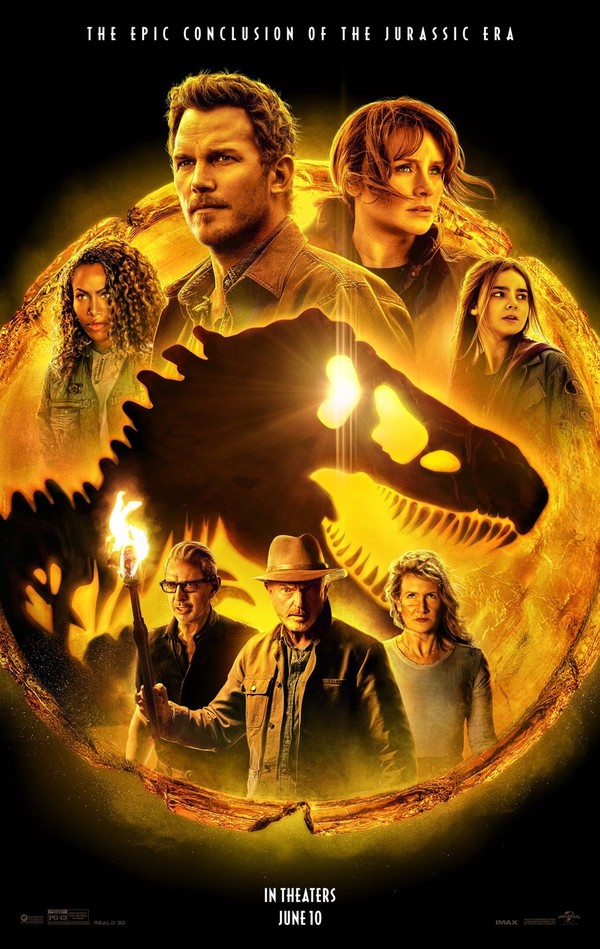Warning: This review contains spoilers for Jurassic World: Dominion.
June 1 saw the release of the final installation of the Jurassic World franchise — a series of six films and multiple novels spanning over 30 years, the last of which is Jurassic World: Dominion. Directed by Colin Trevorrow, Jurassic World: Dominion is the third film in the Jurassic World trilogy, the sequel trilogy to the original Jurassic Park storyline. The film is set four years after the events of Jurassic World: Fallen Kingdom, where the destruction of Isla Nublar — the location of the Jurassic World theme park — causes the spread of dinosaur species throughout the planet. The film covers rather complex topics such as genetics and the moral question of human entitlement to survival. Nevertheless, it is not without its drawbacks.

At its core, the Jurassic World franchise is about dinosaurs. The concept of bringing dinosaurs back from their fossil remnants is what took viewers by storm with the first film in 1990. As we approached more modern times, it was inevitable to see a shift towards the “science” aspect of science fiction, with attempts to canonically explain the scientific methodologies behind the resurrection of dinosaurs. This is all well and good, but it’s hard to avoid feeling like this last installment lost touch with its core a little. Previous films have always had dinosaurs as the core plot point, whether it was the Tyrannosaurus Rex in the Jurassic Park trilogy, or the fictional Indominus Rex in the Jurassic World trilogy. The core plot point in Dominion is a genetically engineered locust strain threatening world food supply, which isn’t quite the selling point that the T-Rex was. The only connection these locusts had with the dinosaurs was that they had genes that “hadn’t been seen since the Cretaceous”, and that to solve the plague required the study of one of the main characters’ and a self-replicating dinosaur’s genes. There was some attempt to introduce the dinosaurs, but the only impact that the dinosaurs really had in terms of the storyline was the inevitable fight between apex predators at the end. Normally, the apex predators are the central plot device of the film, so it makes sense for the climax to showcase their prowess. However, Dominion seems to have force-fed this scene into the film, which would have had no consequence from being omitted. The importance of the world’s food supply chain or the potential devastation of an uncontrollable plague is not being ignored here. However, given the premise of the franchise as a whole, it would have been nice for the plot-driving creature(s) to have slightly more gravitas.
Plot points aside, the characters themselves were largely well-written. One of the major characters was Maisie Lockwood, played by Isabella Sermon. Maisie is a clone of her mother, who was able to “cleanse” Maisie’s genome of a genetic disease that eventually took her life. This was done using a “pathogen” to spread what can only be assumed as a recombination enzyme and sequence combination to alter the chromosomal DNA of each of Maisie’s cells. As a child who was raised very sheltered and away from the affection of her real parents, Sermon depicts her emotional disconnection and awkwardness quite well, as well as the sharp attitude used to hide her vulnerability.
The characters’ dialogue, on the other hand, raised some eyebrows. The franchise isn’t exactly known for its engaging dialogue, but a little more could have been done in Dominion to make the conversations a little more realistic. The number of times that characters in conversation with each other would say the other’s name in full was quite noticeable. Although not specifically detrimental to the flow of the film, it did have an effect on the engagement levels of the audience with the characters.
The last piece of a cinematic experience is the music, and Dominion had quite the legacy to live up to. The theme of the original Jurassic Park, written by the legendary John Williams, is synonymous with the success of the franchise. It was expected that Dominion would have some level of homage to this iconic theme, but it may have overdone it. Almost every scene that involved Dr. Alan Grant (played by Sam Neill) had a piece based off of the iconic theme “Welcome to Jurassic Park”. As much as this piece is beautiful and fits the wonder of the first film, it was noticeably repetitive towards the middle of Dominion. Nevertheless, apart from this, Michael Giacchino did a brilliant job in accentuating the emotions of the characters throughout the film with his music composition.
Recommendations prior to watching this movie would be to have at least watched the first two Jurassic World installments. The characters and the main plotline revolving around Maisie uses events from the first two films, and so it is difficult to follow without prior knowledge. The film in itself is good, but it may be a slight letdown if one expects the majesty and wonder that was experienced from the first Jurassic Park film.

